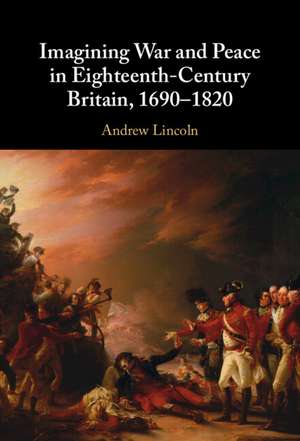Imagining War and Peace in Eighteenth-Century Britain, 1690–1820
Autor Andrew Lincolnen Limba Engleză Hardback – 29 sep 2023
Preț: 593.36 lei
Preț vechi: 652.04 lei
-9% Nou
Puncte Express: 890
Preț estimativ în valută:
113.54€ • 118.84$ • 94.50£
113.54€ • 118.84$ • 94.50£
Carte tipărită la comandă
Livrare economică 31 martie-14 aprilie
Preluare comenzi: 021 569.72.76
Specificații
ISBN-13: 9781009366540
ISBN-10: 1009366548
Pagini: 300
Dimensiuni: 237 x 159 x 25 mm
Greutate: 0.59 kg
Editura: Cambridge University Press
Colecția Cambridge University Press
Locul publicării:Cambridge, United Kingdom
ISBN-10: 1009366548
Pagini: 300
Dimensiuni: 237 x 159 x 25 mm
Greutate: 0.59 kg
Editura: Cambridge University Press
Colecția Cambridge University Press
Locul publicării:Cambridge, United Kingdom
Cuprins
I. Developing Ideals: 1. The Culture of War and Civil Society, from William III to George I; 2. War and the Culture of Politeness: The Case of The Tatler and the Spectator; 3. Sacrifice: Heroism and Mourning; 4. Sacrifice: Christian Heroes; II. Developing Questions: 5. War and the 'Elevation' of the Novel; 6. War and the 'Science of Man'; III. War and Peace in an Age of Revolutions: 7. Complicities in the Novel; 8. Saving Individual Virtue; 9. Saving Communal Virtue; 10. The ideal of Non-resistance; IV. The Landscape of Conquest: 11. A Case Study: Gibraltar.
Recenzii
'Lincoln's book has at its heart a fascinating question: how do eighteenth-century Britons manage at the same time to see themselves as increasingly civilized and as almost perpetually committed to war? In clear, strong prose, Lincoln moves across the long eighteenth century, tackling both a wide range of literary texts and other cultural works including philosophy and journalism and treating both hypercanonical authors (such as Austen) and texts clearly deserving more attention (Richard Glover's Leonidas). Avoiding a reductive binary between war and civilization, he provides a panoramic view of how Britons thought about war and dreamed of peace.' Jeffrey Cox, Distinguished Professor of English and Humanities, University of Colorado, Boulder
'In this rich and expansive study, Lincoln shows that eighteenth-century writers responded to the moral dilemmas posed by modern warfare with a wide range of caveats and compromises, strategies and solutions. Lincoln is an immensely knowledgeable guide to eighteenth-century writing about war, and this fascinating book makes an important contribution to scholarship in the field.' Julia Banister, Senior Lecturer in English Literature, Leeds Beckett University
'In this rich and expansive study, Lincoln shows that eighteenth-century writers responded to the moral dilemmas posed by modern warfare with a wide range of caveats and compromises, strategies and solutions. Lincoln is an immensely knowledgeable guide to eighteenth-century writing about war, and this fascinating book makes an important contribution to scholarship in the field.' Julia Banister, Senior Lecturer in English Literature, Leeds Beckett University
Notă biografică
Descriere
Is war the opposite of peace, or its necessary accomplice? Andrew Lincoln explores this question in relation to eighteenth-century Britain.
